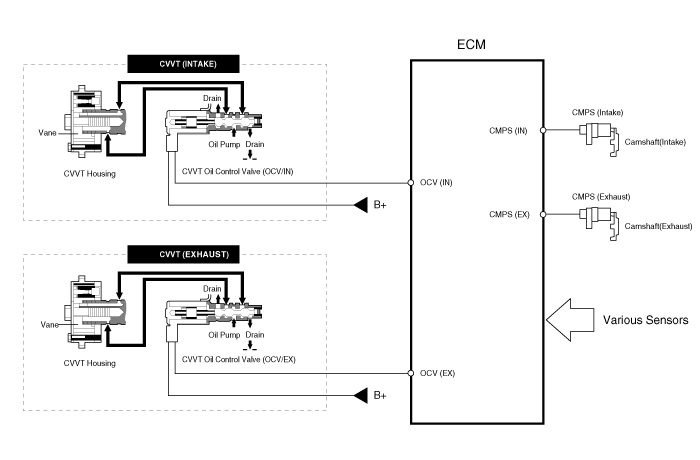 Kia Rio: Description
Kia Rio: Description
Continuous Variable Valve Timing (CVVT) system advances or retards the
valve timing of the intake and exhaust valve in accordance with the ECM control
signal which is calculated by the engine speed and load.
By controlling CVVT, the valve over-lap or under-lap occurs, which makes
better fuel economy and reduces exhaust gases (NOx, HC) and improves engine
performance through reduction of pumping loss, internal EGR effect, improvement
of combustion stability, improvement of volumetric efficiency, and increase
of expansion work.
This system consist of
| -
the CVVT Oil Control Valve (OCV) which supplies the engine oil
to the cam phaser or runs out the engine oil from the cam phaser in
accordance with the ECM PWM (Pulse With Modulation) control signal,
|
| -
the CVVT Oil Temperature Sensor (OTS) which measures the engine
oil temperature,
|
| -
and the Cam Phaser which varies the cam phase by using the hydraulic
force of the engine oil.
|
The engine oil getting out of the CVVT oil control valve varies the cam
phase in the direction (Intake Advance/Exhaust Retard) or opposite direction
(Intake Retard/Exhaust Advance) of the engine rotation by rotating the rotor
connected with the camshaft inside the cam phaser.

1. Exhaust camshaft
2. Intake camshaft
3. Exhaust CVVT
4. Intake CVVT
5. Camshaft bearing cap
6. Camshaft front bearing cap
7. O-ring
8. Oil control valve (OCV) ada ...
The CVVT has the mechanism rotating the rotor vane with hydraulic force
generated by the engine oil supplied to the advance or retard chamber in accordance
with the CVVT oil control valve con ...
See also:
Circuit Diagram
(M/T)
(A/T)
...
Lift And Support Points
When heavy rear components such as suspension, fuel tank, spare
tire, tailgate and trunk lid are to be removed, pla ...
Description
TREAD Lamp
-
Tire Under Inflation / Leak Warning.
1.
Turn on condition
A.
When tire pressure is below a ...
 Kia Rio: Description
Kia Rio: Description
 Components
Components Operation Principle
Operation Principle